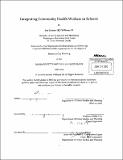Integrating community health workers in schools
Author(s)
Williams, Roy Jerome, III
DownloadFull printable version (12.01Mb)
Other Contributors
Massachusetts Institute of Technology. Department of Urban Studies and Planning.
Advisor
Philip Clay.
Terms of use
Metadata
Show full item recordAbstract
The Patient Protection and Affordable Care Act (PPACA) has set the tone for a radically revised health landscape in America that focuses on community-based care. Our health care system, however, has neither the infrastructure nor the vision to properly account for these demands. One possible solution is to redefine how established positions and organizations can be utilized to help accommodate the emerging needs. School-based health centers (SBHCs), for example, have traditionally provided general health services to students and members of the surrounding community. In many low-income neighborhoods, however, the needs of the community members far outpace the capabilities of the SBHCs and local community-based health centers. One promising answer to the need for community-based care is the integration of community health workers (CHWs) in SBHCs. The PPACA has identified CHWs as an integral component of health teams. They serve to connect people who have been historically marginalized to necessary health services and advocate on the behalf of community needs. This commentary proposes the integration of the CHW role into schools to provide comprehensive health-services to more students and community members than can be currently served. The argument begins with an examination of Massachusetts' CHW advocates' struggle to legitimize the field to gain the professional respect of other medical professions. Next, it explores the possibilities of a CHW in a school setting and makes recommendations to improve the viability and effectiveness of the role. It closes with an analysis of different views of community-based care and the role of planning in negotiating future workforce development challenges.
Description
Thesis (M.C.P.)--Massachusetts Institute of Technology, Dept. of Urban Studies and Planning, 2013. Cataloged from PDF version of thesis. Includes bibliographical references (p. 59-63).
Date issued
2013Department
Massachusetts Institute of Technology. Department of Urban Studies and PlanningPublisher
Massachusetts Institute of Technology
Keywords
Urban Studies and Planning.